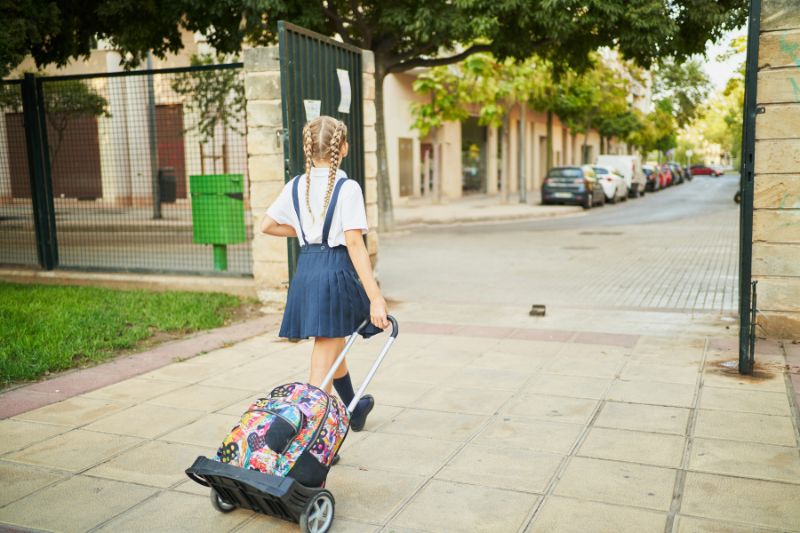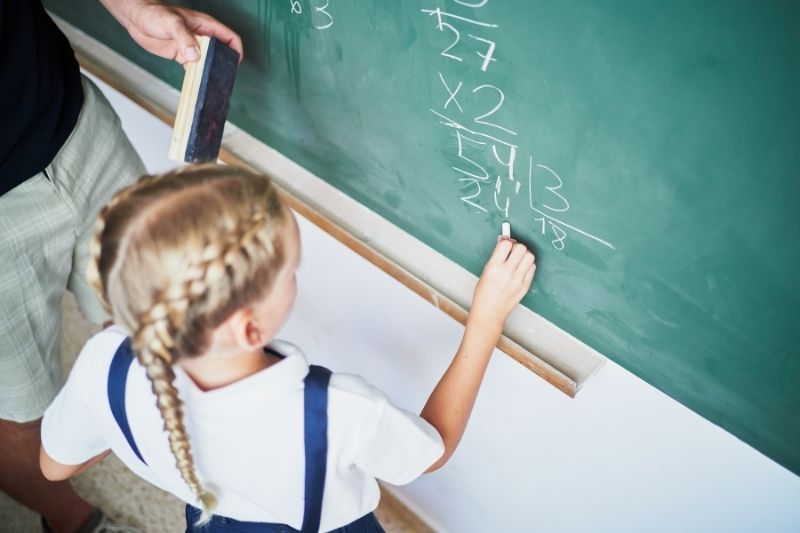Looking for a new start outside the Venezuela is not an easy decision. Leaving behind our land, our customs and part of our family involves a silent mourning that many of us share.
In the midst of this process, one of the most important and at the same time the most delicate steps is to schooling a our children in the Spanish education system being Venezuelans. Because we know how much we miss what is ours, but we also know how essential it is to provide them with a stable education and quality in this new stage of our lives.
There is also a free tool that can make this process easier: the app from Venezuela CodeThe platform is designed to support us in integration, offering help with issues such as education, employment, mental health...
This article is a guide intended to accompany all those who Venezuelan families who wish to schooling their children in Spain with confidence, clarity and, above all, with a heart full of hope.
What does it mean to school in Spain?

Putting a child in school involves formally registering it in the Spanish education system. Here, education is compulsory from age 6 to 16. However, there is also a stage of Early Childhood EducationAlthough it is not compulsory, it is often highly recommended for children from 0 to 6 years of age. enrichment of the small
To better understand how the education system in SpainWe show you the main stages that exist:
- Early Childhood Education (0-6 years): Not compulsory but available. Many families choose schooling from the age of 3 to facilitate the child's integration in an environment that is new to him/her so that when he/she enters school at the age of 6 years old, he/she can Primary Education not be so much change all at once for him.
- Primary Education (6 to 12 years old): Compulsory and free of charge.
- Compulsory Secondary Education (ESO) (from 12 to 16 years old): Compulsory and free of charge.
- After the ESOIn addition, students can choose to continue on to post-compulsory education, such as the Baccalaureate or the Vocational training.
For us Venezuelans, who come from a different education system, schooling in Spain may seem like a new world. But with information and patience, anything is possible.
Legal requirements
Before schoolingIf you are a student, it is essential to have in order certain essential documents that will be asked for in all or almost all schools:
- RegistrationIt is compulsory in order to be able to schooling. To do so, you must go to the town hall of your municipality with a rental contract or an authorisation from the owner of the dwelling.
- Documentation of the child: Venezuelan passport and, if you have one, NIE (Foreigner Identification Number) or any other identity card valid.
- Documentation of the legal representativeDNI or NIE of the father, mother or legal guardian.
- Vaccination cardAlthough it is not compulsory in Spain, some schools, depending on the autonomous community where you are, request it for schooling.
- Family book or birth certificate: To accredit the filiation of the child.
- Certificate of previous schooling (if applicable)If the child has been school-based If you have previously studied in another country, it is useful to present a certificate or report from the previous school.
Types of educational centres in Spain

Before delving into the admission processit is important to be aware of the different types of educational centres in Spain and see which of them can best fit our needs:
- Public schools: are schools which are funded and managed by the Autonomous Communities. Admission is governed by proximity criteria, household income and other conditions established by the administration. They only pay for school materials or complementary services such as canteens, transport, etc.
- Subsidised schools: They are created by private initiativeThey receive funding or subsidies for their maintenance, both from the State and from the representatives. They usually have certain additional costs and are in many cases linked to religious bodies. In short, it combines the best of the public and private systems.
- Public schools: They do not receive public funding and set their own admission criteria, deadlines and tuition fees. Costs are often high, with families having to pay tuition, fees and other services.
The school admissions process step by step

The process of admission in Spain usually follows these steps:
Publication of vacancies
Each Autonomous Community publishes annually the number of places available in public and charter schools. This information is usually available in the educational portals official. Although each community has its own calendar, in general, the schooling applied for between March and May
Submission of applications
Families must submit the application for admission within the deadlines established by each autonomous community. This can be done in person (usually recommended) at the schools or through the educational platforms of each region.
Scale and points:
Some of the points allocated according to certain criteria:
- Proximity of the parent's or legal guardian's home or place of work as
- Brothers at the centre
- Low household income
- Disability of the pupil or a member of the family
- Large family
Publication of provisional lists
Once the applications have been evaluated, a list is published with the admitted students. At this point, families can lodge complaints if they consider that there has been an error in the allocation.
Final lists and enrolment
After settling any complaints, the definitive list of admissions. Parents must register within the indicated deadline to secure a place.
What if you get halfway through the course?
You can schooling You can send your child at any time of the year if you are moving to Spain when the school year has already started. All you need to do is go to the Department of Education of your autonomous community. They will assign you to a centre near you with available places.
Validation of previous studies
If your child was already studying in Venezuelayou can start the process of approval Approval of their studies. This step is not compulsory for schooling at basic levels, but for secondary and baccalaureate. The main things you will need:
- Legalised and Apostilled Transcripts
- Syllabus
- Sworn translation (if the documents are in another language)
What if you don't have papers?

If you find yourself in a irregular situationDon't worry, in Spain, the law guarantees the right to the right to education for all minors, irrespective of their legal status. It is a fundamental right that cannot be denied, and children, regardless of their situation, should have access to a decent education.
You can schooling your child in a completely legal way, even if you do not have the proper documentation. The first thing you should do is to go to the school office in your area or to the nearest educational centre.
They will provide you with all the information you need to start the process and will be able to guide you through the steps to follow, without your situation being an impediment.
Remember that the public education centres and concerted cannot refuse the access to education Even if your legal status is irregular, your child has the right to study and develop in a safe and appropriate environment.
In addition, many centres and organisations are willing to provide additional support in these circumstances, so don't hesitate to ask for help if you need it.
Scholarships and grants available for immigrant families

School It does not have to be an unbearable financial burden for your child. There are a number of aids available:
- Dining room grantFor low-income families.
- Scholarship for school suppliesTo cover the cost of books, uniforms or stationery.
- Rental subsidiesIndirectly, they help you to get registered and schooling.
- MEC GrantsFrom the Ministry of Education, especially for higher levels.
Find out more at the town hall, at the school or at NGOs such as Red Cross, CEAR o Caritaswhich can also provide guidance to Venezuelan familiess new arrivals.
In addition, as we have already mentioned, there is a virtual platform, Virtual Venezueladesigned to connect and empower the Venezuelan talent abroad. It is a wonderful tool to feel accompanied and to have access to fundamental resources for our integration.
School is only the first step. The most beautiful and sometimes the hardest thing is to see how our children adapt to a new situation. new culture.
Seeing them, learning words that we don't use in VenezuelaWe listen to their mixed accents and see how they make friends. And yes, we also cry a little when they ask us why we don't celebrate carnivals here or why their grandparents are so far away.
But every step, every achievement, every day at school is a seed of hope that we plant in this new land. Because even if we have left behind our streets, our flavours and our roots, we will never stop being Venezuelans. And we teach that at home, too, along with the multiplication table.
From CuriaraWe hope you have found this guide helpful in facilitating the process of schooling of your children in Spain.
